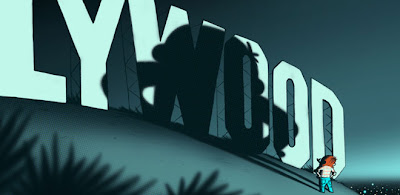In case you haven’t been checking in every day (tsk tsk), there’s an article in this month’s (December) Wired about Scriptshadow. Up until recently, it was only available in the print version, but they’ve since put it up online. So check it out. (p.s. I don’t look like that guy in the picture).
Genre: Sci-Fi
Premise: In the year 2047, a man pursues an illegal super-gene that can extend a person’s life by 300 years.
About: J.J. Abrams and David Klass sold this back in 1994. That was back when J.J. was writing and selling a lot of scripts, including the complicated (and much better than the movie) Regarding Henry, which he wrote when he was 24. One of the craziest writing stories I’ve ever heard is when a movie at the beginning of production (I’m so sorry but I’ve forgotten the title) didn’t feel like they had the script right. So they called J.J. and told him they wanted him to do a quick 1 week rewrite, and would pay him 1 million dollars for it. J.J. showed up but once he got there, everyone decided that they didn’t want to change the script afterall. So J.J. just hung out for a week and picked up a million dollar check. It’s one of those stories that sounds too good to be true but this is apparently well-known. Does anybody know what movie I’m talking about? I’m pretty sure it was a Michael Bay movie. Maybe The Island?
Writer: J.J. Abrams and David Klass
J.J. Abrams, to me, is this generation’s Steven Spielberg. Like a character in a video game, everything he touches is infused with an upgrade. This is a man who’s tapped into the collective conscience in a way nobody else is even close to right now. I mean, he figured out a way to make Star Trek cool! But before J.J. was an A-list Hollywood director. Heck, before he was even a TV director, he was a writer, like you and me. And this is one of his early efforts.
The last big 90s sci-fi script I reviewed was Kurt Wimmer’s Exit Zero. It’s funny reading these scripts because no matter how talented the writers are, the scripts are just dated. I mean, I think every 90s action script ever written has a guy running towards a window, shooting it, then jumping through, hurtling towards death, only to be saved by some “surprise” last second mechanism. Oh, and don’t forget the motorcycle chase where the motorcycer evades his pursuers by sliding under a semi truck. Yup, sadly, both of these appear in Shelter. If I see either of these scenes in screenplays TODAY, btw, I stop reading.
I have nothing against 1994 J.J., but 1994 J.J. is pretty fucking terrible. I mean this is a sprawling mess of a script in every way possible. It’s got no story. It’s got no direction. It’s got no point. Every bad choice that could have been made is made. I don’t even know where to start. I guess I’ll start with the story. If you can call it that. It’s New York City 2047. The distant and soulless Jack Muller is a high-tech thief. He and his futuristic mod squad break into a rich dude’s penthouse and jam a needle into his spine, extracting what, I think, is important molecular fluid that may or may not allow people to live for 300 years.
Jack meets up with his father, Derrek, who’s thrilled about this super-fluid, because the two can sell it to the Russians for millions of dollars and retire. Except while they’re making the deal with said Russians, the police swarm in and whisk them off to jail. For reasons I forgot and because there’s no way in hell I’m wasting any time going back to check, it’s determined that Jack will go into a witness relocation program.
The script then says the hell with what you thought this story was and becomes a witness relocation script! Are you bored out of your mind yet? Jack becomes “Michael” and moves in with the mysterious “Susan,” someone who’s also done something so bad she can’t talk about it. The two, even though they hate each other, must pretend to be husband and wife. Under no circumstances are they ever allowed to talk about their pasts. After an endless number of “Michael and Susan hang out” scenes that I swear had more tryptophan in them than tonight’s turkey dinner, we learn that Susan’s actually a double-agent, part of a setup to try and extract information out of Michael about where he’s hidden the immortal gene fluid.
Oh but wait! It gets complicated when Susan starts to fall for Michael! Ugh, please kill me now. This is worse than New Moon. Eventually she comes clean to him. Michael’s pissed. He leaves to try and reconnect with his dad. In the meantime, Susan tries to figure out where her allegiance lies. Does she help the “Program” get the immortal fluid? Or does she help Michael escape? I wish she would’ve picked option number 3. Killing me.
I’d be interested to hear what J.J. thought of this script today. Would he champion it? Would he admit that it sucked? For a man who can get anything he wants produced, there may be a damn good reason this remains unmade. Still, it’s an interesting glimpse into J.J.’s early sci-fi forays. For example, there’s a scene early on with robot motorcyclers that no doubt inspired the robot motorcycle that chases young Captain Kirk in the Star Trek movie. Other than that though, I’m giving this one a big fat snooze-alert. You’ve been warned.
Script link: No link
[x] What the hell did I just read?
[ ] barely kept my interest
[ ] worth the read
[ ] impressive
[ ] genius
What I learned: So work with me here for a second. Why would you create a story where your characters sit around and do nothing? Why would you create a movie where your characters wait for things to happen to them? If you’re writing a story, have it be with a character who’s *actively pursuing his goal!* That makes your character *active*. The fact that he’s *doing* something will add a thousand times more excitement to your movie. It’ll also make your main character a thousand times more interesting. Put your character in a story where he waits around dozens of pages for something bad to happen and you’re going to bore your reader into a coma.
Genre: Independent Drama
Premise: Recently released from the nuthouse, Roger Greenberg moves into his vacationing brother’s home, where he befriends the nanny, who’s 15 years younger than him.
About: From the writer/director of The Squid And The Whale and Margot at The Wedding comes “Greenberg,” Noah Baumbach’s latest film.
Writer: Noah Baumbach

Oh boy. A Noah Baumbach script. Welcome to Depression-ville. I will admit that The Squid And The Whale displayed a writer/director with a unique voice. But Margot at The Wedding was so relentlessly depressing and cruel, I wanted to crawl up in a ball and weep for a fortnight afterward. Not exactly the feeling I like to have when I’m leaving the theater. For this reason, Greenburg wasn’t on my radar. I figured I’d catch it on a bored Tuesday night as a $1 kiosk rental while I spent the majority of my attention scouring useless entertainment and sports blogs (does anybody get their info from traditional websites anymore?)
But this trailer changed all that. I don’t know what the rapidly changing litmus test says about Ben Stiller these days, but I still love him. He’s the only comedian who’s “sold out” yet still maintains the ability to be funny in those sanitized PG-13 family roles. Stiller is actually just what a Noah Baumbach movie needs. Someone who can handle the weightier stuff, but who carries that “It’s all going to be okay in the end” demeanor. The man doesn’t take life too seriously. And that mixes well with a writer/director who obviously does.
Well, I’m happy to report that not much has changed in Baumbach’s sixth film. “Greenberg” is a slow, depressing, sometimes cruel, frustrating, cynical and awkward look at a relationship that never stood a chance from the word ‘go.’ Florence is a 25 year old nanny/housesitter whose wealthy Los Angeles clients are spending a couple of weeks vacationing in Vietnam. Roger, the indie-freely “recently got out of the nuthouse” brother of the family, is going to be staying at the home while the family’s away. This opens up the door for Roger and Florence to have a totally unhealthy and ill-advised relationship. Needless to say, if there were an Awkward Relationships Olympics, anything that Noah Baumbach writes would medal. But Greenberg definitely takes the gold. For example, besides the numerous disastrous attempts at oral sex that occur (seemingly every ten pages or so), we must endure the painstaking trainwreck of conversations that happen afterwards in high-definition detail.
The relationship actually follows the “guy not ready for commitment” model but does so in the ultra demented Baumbachian universe. Greenberg’s issue is that he doesn’t want to do anything. He just wants to live a normal unattached existence. The problem is, he gets bored quickly, and therefore ends up hanging out with people he doesn’t want to be hanging out with. When things don’t go well, which is always, he bitches to them about being in his life, as his plan is to not be doing anything. Does that make sense to you? Yeah, not me either really. The biggest victim of this compulsive waffling is Florence, who is so vague in her own approach to life, that the two spend the majority of the script dancing around every possible definitive statement in the history of language.
Along the way, the family dog gets sick and the two are roped into keeping the poor pooch alive, at least until the family gets back. Greenberg also ends up connecting with old friends in sort of a “10 years later” version of Garden State. His good buddy Ivan is going through a divorce and Greenberg stammers his way through his version of support. There’s also a backstory about Greenberg being in a band with Ivan and another friend that went south during a sketchy record deal. The still unhealed wounds leave a black cloud over most of their interactions. Since Florence is also a singer, Greenberg starts to get the bug again, and at the ripe old age of 41, wonders if he shouldn’t be giving that old singing career one more try. But if you’re looking for a feel-good comeback story, I don’t think I have to remind you that you’re watching a Noah Baumbach movie.
The toughest thing about a Noah Baumbach piece is that he writes from a place of such deep hatred for the world, of its conventions, its standards, its idiosyncrasies, that unless you harbor that exact same outlook, the script feels more like a blunt object repeatedly smashing against your head than an eye-opening observational piece that reaffirms your beliefs. If Baumbach could balance this hatred out with some more humor, I feel like he could really broaden his audience. I mean even though Larry David writes in a different genre, he writes from that same place as Baumbach. The difference is, he has fun with it. When I put down this script, I felt like I’d been through a 24 hour screaming match with one of my best friends. It was too much for me.
One final note. I really really like this actress Greta Gerwig, who plays the role of Florence, and I think she’s going to blow up soon. She brings something totally unique to the table, unlike anything I’ve seen from any other actress. I’ll be seeing this movie to see her.
[ ] What the hell did I just read?
[x] barely kept my interest
[ ] worth the read
[ ] impressive
[ ] genius
What I learned: Noah Baumbach doesn’t follow any conventional screenwriting practices whatsoever. As a result, you get sort of an awkward strange unfocused story. If that’s where your love of writing lies, then by all means embrace it. However, I will make a promise to you. You will never sell one of these types of scripts if you’re an unsold screenwriter. What Baumbach brings to the table is that he’s also a director, which means the script is more of a package than a standalone screenplay. If you’re going to write this kind of script, I strongly recommend that you plan to direct it yourself. It’s really the only way these kinds of screenplays get made.
 As some of you have been discovering, there’s an article in this month’s “Wired” about Scriptshadow. Pretty darn exciting, huh!? I don’t know what else to say other than I’ve been reading Wired for like 10 years so it’s downright cool as hell that anything I’ve done would make it into the magazine. Want to thank Scott Brown, the writer of the article, for contacting me and asking me to do it. So, needless to say, go out and buy f’ing Wired!
As some of you have been discovering, there’s an article in this month’s “Wired” about Scriptshadow. Pretty darn exciting, huh!? I don’t know what else to say other than I’ve been reading Wired for like 10 years so it’s downright cool as hell that anything I’ve done would make it into the magazine. Want to thank Scott Brown, the writer of the article, for contacting me and asking me to do it. So, needless to say, go out and buy f’ing Wired!
P.S. If you’re showing up to Scriptshadow for the first time from the Wired article, you may want to check out the Reader Top 25 thread, which links to a lot of the best scripts reviewed on the site. Also, here are some of the more popular reviews (for one reason or another) from the site…
1) Memoirs
2) Moneyball
3) The Social Network
4) Black Swan
5) Dogs of Babel
6) The Muppet Man
Genre: HorrorPremise: When Pattinson must leave Kristin Stewart after a paper cut, a band of oversized dogs wreaks havoc on her town.
About: The second book in the Twilight phenomenon.
Writer: Melissa Rosenberg (adapted from the novel by Stephanie Meyer)

In a fit of curiosity, I rented Twilight last year. I don’t remember much but here’s what stuck out. Kristin Stewart is the single worst actress on the planet. The scene where Robert Pattinson first sits by her in class and freaks out is the worst-acted scene in history. I’ve seen better production value in a Michael Moore documentary. As for the story itself, I remember girl meets vampire, vampire can somehow walk around in daylight, vampire comes back to save girl in worst directed action scene ever. So if you’re looking for a Twilight theologian, I’m not your guy. But if you want a snarky subjective look at the screenplay for the second movie, I can help.
New Moon is highly amusing, though not for the reasons it wants to be. I think my favorite part about New Moon is that the filmmakers were so desperate to keep Robert Pattinson in as many scenes as possible (even though he has nothing to do with the movie), that they turn him into Obi-Won Kenobi. Throughout the script he does a lot of remote whispering, using his vampire voice over powers to warn Bella of trouble.
He also appears as an apparition at least a dozen times. The great part about that is every time he showed up, he’d turn a perfectly comprehensible scene into a confusing mess. I’d say with complete confidence that I understood every scene perfectly until Pattinson showed up. We’d be rolling along smoothly, then all of a sudden there’s Pattinson, who’d say something like, “Bella, backwards and forwards, we all fall down.” These cryptic messages would apparently mean something to Bella, which she’d act on, and a page or two later the scene would end in a cacophony of confusion. This would always result in me rubbing my temples and wondering if I was retarded.

As for what New Moon is about, well, I guess it’s about these vampires realizing that Bella is starting to look like a ten foot hot dog. So Pattinson’s like, omg, I’m leaving you bitch. But he spins it to sound like he’s protecting her somehow. Bella kinda wants to turn into a vampire (hey, she’s already got the look down pat) so she can be with him but he puts the kibosh on that because playa gotta keep his options open.
So Pattinson jets, leaving behind his annoying semi-invisible emo doppelganger. Bella feels lonely and confused, which pushes her into a friendship with poor townie boy, Jacob. Jacob, as you may have seen from the trailers, seemingly raided Roger Clemens’ closet, as this 17 year old kid somehow has the body of Mike Tyson in his prime. The two start hanging out and Jacob clearly wants a little action from the pale wildebeested one, but she throws the “just friends” tag on him and that ends their friendship real quick (doesn’t it always?).

The script then follows with about 6 million montages, most of them having to do with Bella visiting this field she’s obsessed with. I think she believes she’ll find Pattinson there, but since he’s always around in ghost mode anyway, I never saw the logic behind it. If she wanted to find him, she just had to be really clear about something. This would of course summon him so he could confuse us. That’s how I’d do it anyway.
Anyway, Bella goes to apologize to Jacob about the “just friends” tag only to find out that – duh duh duhhhhhhh – he’s actually a werewolf! Now if you’re like me you’re probably saying, “This chick has to be the most unlucky teen in the world. It just so happened that the only two guys she’s ever liked were a vampire and a werewolf.” However, in defense of the script, it’s implied (not very well but I’m pretty sure it’s in there) that the whole reason the werewolves were here was they were looking for and planned to take down Pattinson’s vampire posse.
Concurrent with this plot, is a secondary plot, whereby some vampire bitch (I’m guessing this is Dakota Fanning’s character) is pissed off that Bella killed her boyfriend back in that terrible final scene from the first film, and is coming for revenge. So the Bigfoot boys realize they can use Bella as bait, reel in the tramp, and feast on some tasty vampire meat. Jacob, who seemed like a nice guy, is totally okay with maiming and killing all of a sudden, and in favor of using Bella as bait, which doesn’t exactly instill the foundation for a healthy relationship (of course this is just my opinion).
I’ll be honest, the whole Twilight obsession is creepy to me. When you have 35 year old female hosts on Entertainment Tonight asking the 17 year old kid who plays Jacob, “Can you lift up your shirt so we can see your abs?” I mean…that doesn’t even happen on the female side. You don’t see guy reporters saying, “Hey Miley Cyrus. Can we check out your midriff. Gotta have some masturbation material for later.” It’s way too much for me.
The funny thing is, there were some seeds for a good movie here. I’m guessing this will probably be explored in the sequels, but there’s this great moment early on where Pattinson and Jacob are both pining for Bella’s attention, and you can just sense the most intense multi-layered destructive violent love triangle of all time. However the scene ends and Casper Von Pattinson takes off, never to be seen again (well, depending on how you look at it).
The script was messy and awkward. What more is there to say? I’m outta here.
[ ] What the hell did I just read?
[x] barely kept my interest
[ ] worth the read
[ ] impressive
[ ] genius
What I learned: More like what haven’t I learned. I’m trying to figure out why Twilight became a breakout sensation. There were thousands of vampire books before this one. What did Twilight do differently that worked? Anyone care to educate me?





